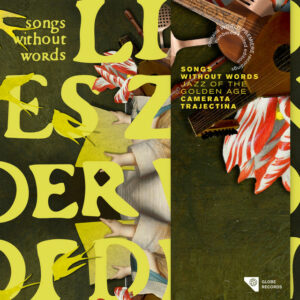 Camerata Trajectina is een gezelschap dat zich al een halve eeuw bezighoudt met de Nederlandse liedcultuur. Maar zie daar: een prachtig bevlogen album met ‘liedjes zonder woorden’: Songs without Words.
Camerata Trajectina is een gezelschap dat zich al een halve eeuw bezighoudt met de Nederlandse liedcultuur. Maar zie daar: een prachtig bevlogen album met ‘liedjes zonder woorden’: Songs without Words.
English version below
In de Middeleeuwen waren het de trouvères en troubadours die rondtrokken en met ‘geleende’ melodieën de laatste nieuwtjes bezongen. Op het instrumentarium dat voorhanden was, werden melodieën hergebruikt: veranderd, in diverse bezettingen gespeeld en er werd op geïmproviseerd. Dat laatste vinden we ook uitgebreid terug in het repertoire van bijvoorbeeld de blinde Utrechtse muzikant Jacob van Eyck (1590-1657) die in zijn bundel Der Fluyten Lusthof (1644) improvisaties noteerde van zo’n 150 melodieën. En natuurlijk in de be-bop traditie waar uitgebreid wordt geïmproviseerd op Jazz Standards, die o.a. te vinden zijn in The Real Book. Het gezelschap Camerata Trajectina (op dit album als kwartet) doet op hun album Songs without Words iets soortgelijks. Melodieën, chansons, madrigalen en akkoordschema’s (zoals het bekende La Folia) uit overwegend de 16de en 17de eeuw zijn bewerkt voor blokfluit, viola da gamba (soort cello), harp, luit en gitaar.
Het resultaat is een brede schakering van instrumentale muziek in diverse bezettingen. De melodie, het thema, wordt afwisselend gespeeld door blokfluit, harp of viola da gamba. Soms per compositie of variërend per arrangement. Zo horen we in het openingslied Est-ce mars achtereenvolgens de blokfluit, de harp en de viola da gamba in de melodie. Het werk sluit af met een tripla: een korte variatie in 3-telsmaat. Deze variatie komen we ook tegen in het Passamedley or Pasticcio antico, waarmee de CD afsluit. Heel bijzonder is ook het akkoordenschema van Ballo del Granduca (Sweelinck). Een fraai gedragen stuk, uitgevoerd op 3 viola da gamba’s in een innig psalm-timbre met diverse omspelingen en variaties rondom een aantal akkoorden. Daarnaast vinden we op Songs without Words een suite uit het liedboek Valerius’ Gedenck-clank (1626) en werken van de Britse componist Matthew Locke die gevonden werden in de liedboeken van Anthonie Pannekoeck, een Amsterdamse speelman. Waarmee maar weer eens wordt bewezen dat liederen heel Europa doorreisden.
Camerata Trajectina levert met Songs without Words een voortreffelijk album. Warme muziek, uitgelezen repertoire, uitgevoerd met liefde en aandacht waar je echt sprakeloos van wordt!
- Luister in deze Youtube naar het volledige album
Meer oude muziek
- Klik hier voor: Oude nieuwe klanken van – J. G. Pisendel
- Klik hier voor: Dit is Linaris…
- Klik hier voor: Onbekend wordt bemind door het Redherring Baroque Ensemble
English version
Camerata Trajectina is an ensemble that has been involved in Dutch song culture for half a century. But listen, how about this: a beautifully inspired album with ‘liederen zonder woorden’: Songs without Words.
In the Middle Ages it were the trouvères and troubadours who traveled around and sang about the latest news with ‘borrowed’ melodies. On the instruments that were available, melodies were reused: (re)arranged, played in various formations and line-ups and improvised were added. The latter can also be found extensively in the repertoire of, for example, the blind Utrecht musician Jacob van Eyck (1590-1657). He noted improvisations of about 150 melodies in his collection Der Fluyten Lusthof (The Lovely Flute Garden: 1644). And of course there’s the be-bop tradition with an extensive improvisation on Jazz Standards, which can be found in The Real Book. The Camerata Trajectina company (on this album as a quartet) does something similar on their album Songs without Words. Melodies, chansons, madrigals and chord progressions (such as the well-known La Folia) from mainly the 16th and 17th centuries have been arranged for recorder, viola da gamba (a kind of cello), harp, lute and guitar.
The result is a wide variety of instrumental music in various line-ups. The melody, the theme, is alternately played by recorder, harp or viola da gamba. Sometimes per composition or varied in the arrangement. For example, in the opening song Est-ce mars we hear consecutively the recorder, the harp and the viola da gamba play the melody. The work closes with a tripla: a short variation in 3-count measure. We also come across this variation in the Passamedley or Pasticcio antico, closing piece of the album. The chord progression of Ballo del Granduca (Sweelinck) is also very special. A beautifully played piece, for 3 viola da gambas with a psalm timbre, with various allusions and variations around a number of chords. There is also a suite on the album Songs without Words from the famous songbook Valerius’ Gedenck-clank (1626) and compositions by the British composer Matthew Locke that were found in the songbooks of Anthonie Pannekoeck, an Amsterdam based musician. This proves once again that songs travel throughout Europe.
Songs without Words is an excellent CD Camerata Trajectina. Warm music, an exquisite repertoire, beautifully performed with love and attention that really leaves you speechless!
More classical music
- Click here for: Oude nieuwe klanken van – J. G. Pisendel
- Click here for: Dit is Linaris…
- Click here for: Onbekend wordt bemind door het Redherring Baroque Ensemble
- Camerata Trajectina: Songs without Words (Globe records)
© Mattie Poels.

Geen reacties